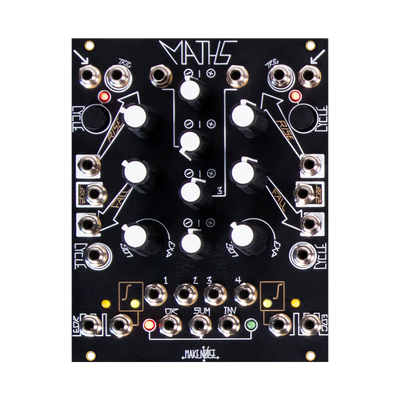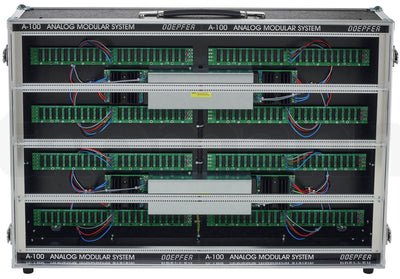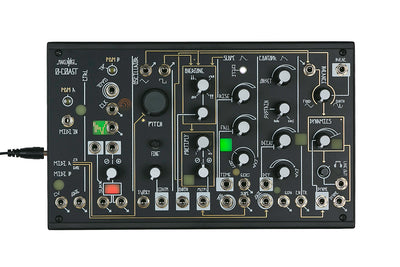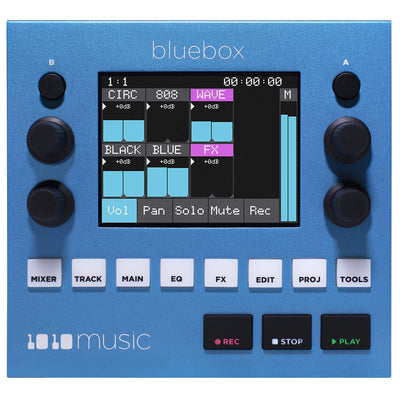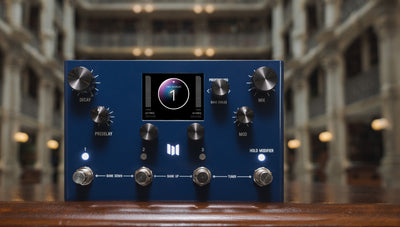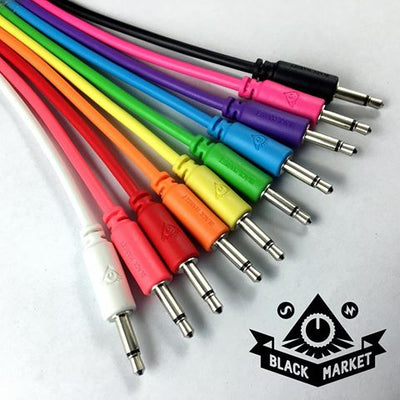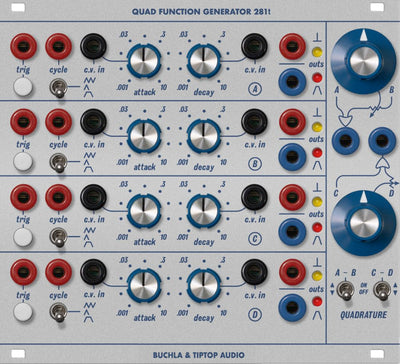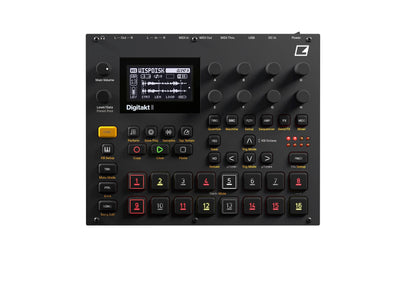NEW IN MINITAUR REV 2:
• Store 100 presets to Minitaur's internal memory.
• A new Decay/Release mode allows for independent control of Decay and Release times from Minitaur's front panel.
•Pitch, Volume and Gate Controller inputs can be re-mapped to other control parameters.
•Minitaur can now act as a CV to MIDI converter.
Click HERE to download Minitaur REV 2 firmware.
REV 2 requires the Minitaur REV 2 Editor/Librarian. To receive the free Minitaur Editor/Librarian register your Minitaur at moogmusic.com/register.

Moog Music is incredibly honored that Minitaur received the 28th annual TEC award for Outstanding Technical Achievement - Musical Instrument - Technology/Hardware.
Minitaur is a powerful, compact Analog Bass Synthesizer that features a classic one knob per function design. It is the first instrument in the Taurus family that does not have foot pedals. At only 8.5" x 5.25" and less than 3lbs, the Minitaur puts legendary analog Moog bass into a package designed to fit seamlessly into today's performance and production environments. There are no confusing or convoluted menus to dig through. Plug in a MIDI controller or hook it up to your computer and start playing immediately.
Don't be fooled by it's size. Minitaur delivers all the growl, snarl and low end associated with the Taurus family of Bass Synthesizers in a rugged performance package that is small enough to take with you anywhere.
• One knob per function interface for tweaking and creating new sounds on the fly. It also makes live performance a blast.
• Two oscillators with Sawtooth (Original Taurus) and Square wave-shapes for each VCO. Recreate sounds of the original Taurus with Sawtooth waves, or create new sounds with square waves or a combination of both.
• 2 Mixer VCAs for VCO levels control of Oscillators 1 and 2.
• Moog Ladder Filter with adjustable resonance delivers classic Taurus 1 and 3 bass and boom.
•Two Minimoog style ADSR Envelope Generators for modulating VCF and VCA. The Decay and Release segments are controlled by the Decay knob, while the Release segment is enabled or disabled via Release On/Off switch.
• Midi-syncable LFO with Controls for Rate, VCO LFO Amount, and VCF LFO Amount
• DIN MIDI and MIDI over USB offer complete control of the Minitaur's sound engine.
• Analog Control inputs for Pitch, Filter, Volume and Gate. Use an EP2 or CV to connect and control MInitaur with everything from Modulars to Moogerfoogers.
• External audio input for processing external audio through the Mixer and Filter section of Minitaur.
• Headphone output with 1/8" connection.
• Compact rugged steel chassis that is built like a tank.
Front Panel Controls:
•VCO2 Frequency – Sets the frequency offset of VCO2 from VCO1 from -1 Octave to +1 Octave. Center is unison with VCO1.
•Oscillator 1 & 2 Saw/Square Waveform Selector – Selects a Sawtooth wave (LED OFF) or Square wave (LED ON) Signal for VCO1 and 2.
•VCO1 Level – Sets the level of VCO1
•VCO2 Level – Sets the level of VCO2
•VCF Cutoff – Sets the Cutoff Frequency of the 4-pole Moog Lowpass VCF from 20Hz to 20KHz
•VCF Resonance – This sets the gain for the amount of signal from the output of the VCF fed back to the input of the VCF. This creates a peak in Frequency response at the Cutoff Frequency that can be increased all the way to self-oscillation.
•VCF EG Amount – Bi-polar control sets the (+) or (-) Amount of Envelope Generator modulation of the VCF. Center is no Envelope Generator modulation.
•LFO Rate – Sets the frequency of the LFO. Range is from 0.01Hz to 100Hz
•LFO VCO Amount – Sets the Amount that the LFO modulates the VCO
•LFO VCF Amount – Sets the Amount that the LFO modulates VCF
•VCA EG Attack – Sets the attack Time of a Minimoog-Style ADSR Envelope Generator used to modulate the VCA. Time ranges from 1 msec to 30 seconds.
•VCA EG Decay/Release – Sets both the decay time to the sustain level and release time of a Minimoog-Style ADSR Envelope Generator used to modulate the VCA. Time ranges from 1 msec to 30 seconds. The Release segment of the EG is enabled by the Release On/Off switch.
•VCA EG Sustain – Sets the sustain level of a Minimoog-Style ADSR Envelope Generator used to modulate the VCA.
•VCF EG Attack – Sets the attack Time of a Minimoog-Style ADSR Envelope Generator used to modulate the VCF. Time ranges from 1 msec to 30 seconds.
•VCF EG Decay/Release – Sets both the decay Time to the sustain level and release time of a Minimoog-Style ADSR Envelope Generator used to modulate the VCF. Time ranges from 1 msec to 30 seconds. The Release segment of the EG is enabled by the Release On/Off switch.
•VCF EG Sustain – Sets the sustain level of a Minimoog-Style ADSR Envelope Generator used to modulate the VCF.
•Release On/Off Switch – Enables (LED On_ or Disables (LED Off) the Release segments of both Envelope Generators.
•Glide On/Off Switch – Enables/ Disables the Glide function
•Glide – Sets the rate of Glide when the note controlling the MINITAUR changes.
•Volume – The Master Volume of the MINITAUR’s synth Engine.
•Fine Tune – Adjusts the frequency of the VCOs +/- 1 semitone.
•MIDI Indicator LED – Indicates incoming MIDI activity
•LFO Rate Indicator LED – Indicates the rate of the LFO.
Back Panel:
•Audio Out – 1/4" Unbalanced jack.
•Headphones -- Jack for stereo headphone output.
•Audio In – 1/4" Unbalanced jack accepts line-level input.
Analog CV Inputs:
•Pitch CV – 1/4" TRS Jack accepts 0 to +5V signal (internally processed for 1 V/Octave) via passive Expression Pedals or CVs.
•Filter CV – 1/4" TRS Jack accepts 0 to +5Vsignal via passive Expression Pedals or CVs.
•Volume CV – 1/4" TRS Jack accepts 0 to +5Vsignal via passive Expression Pedals or CVs.
•Gate – 1/4" Jack accepts a 0 (Off)/ +5V(On) Gate signal to trigger the unit’s EGs.
MIDI:
•MIDI (DIN) – Standard DIN MIDI input for MIDI Control of the MINITAUR
•MIDI (USB) – Type B USB connector for connecting MINITAUR to host for USB MIDI.


